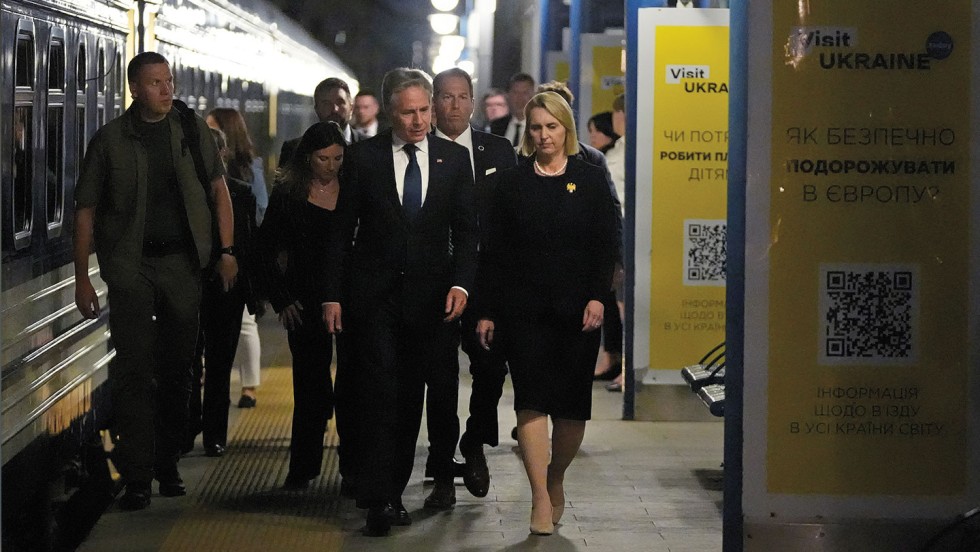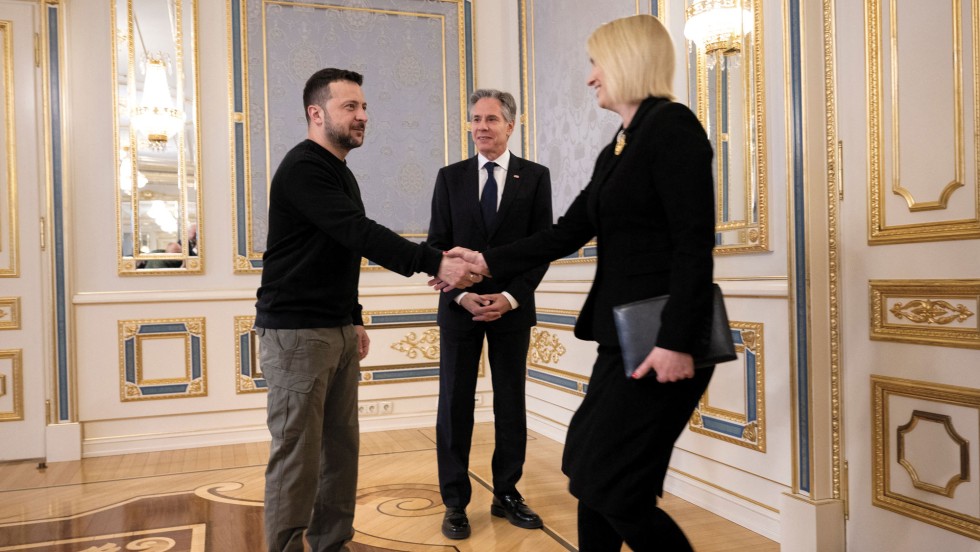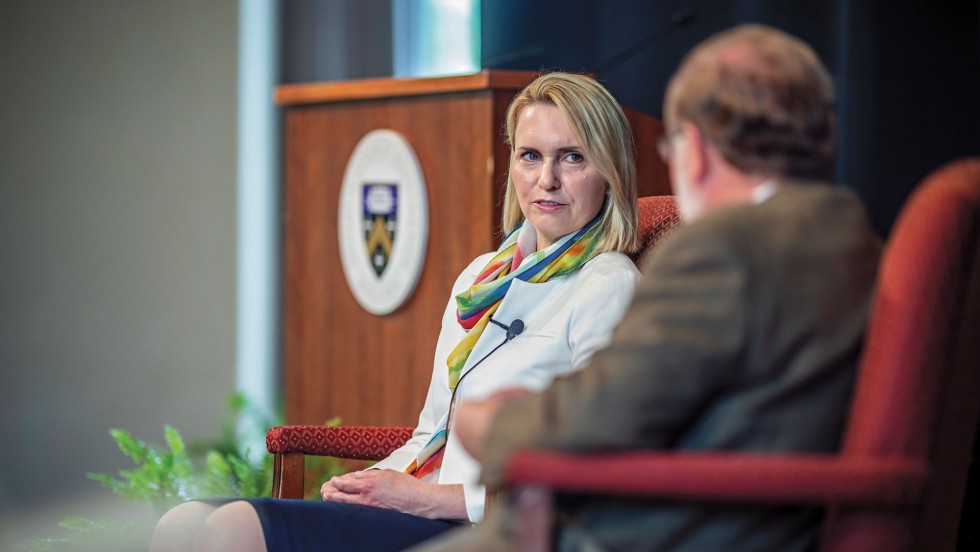$532 Million Is Only the Beginning
Examining the impact — and work left to do — after the record-breaking Our Path Forward to the Bicentennial…
Read The StoryAt the pinnacle of a decades-long career in the Foreign Service, Ambassador Bridget Brink ’91 relies on lessons she first learned at Kenyon to navigate the literal and figurative minefields of Russia’s war in Ukraine.
Story by David Hoyt ’14
(Editor’s Note: Bridget Brink ’91 was appointed by President Joe Biden to serve as ambassador to Ukraine in 2022. She resigned the post in April 2025 after nearly three years.)
Bridget Brink ’91, the United States Ambassador to Ukraine, spends more time traveling via 19th-century means than you might expect for a 21st-century diplomat. Air travel in a war zone is too dangerous, so in order to get into, out of, and around Ukraine, Brink must travel by railroad, slowly, sometimes under cover of darkness.
During one such night journey, to the port city of Odesa along the Black Sea, Brink woke up to find the train halted, seemingly in the middle of nowhere. Her security staff informed her that there were reports of missiles being launched in their direction, with an unknown destination. Their only option was to stop and wait for the all-clear.
“I worried about my team, and I worried about my family,” Brink said. “And I said a little prayer. That’s about it. You can’t do more than that.”
As someone responsible for calming tensions in a war zone, Brink has a lot to worry about most days. Just a few months after Russia commenced a full-scale invasion in February 2022, President Biden nominated Brink, who had been serving as Ambassador to Slovakia since 2019, to be America’s top diplomat in Ukraine. She was confirmed by the Senate, unanimously, within weeks.
She also finds herself in the unenviable position of being a studiously apolitical public servant doing a job that is surrounded by politics. Like all ambassadors — but doubly so for those who serve in times of war — her expectation is to walk a fine line: externally, to carefully and precisely articulate the official positions of the United States; internally, to provide expert advice and counsel to her superiors at the State Department and within the White House. Once you add foreign allies and adversaries, Congress, and the media into the mix — well, that might also call for a little bit of prayer and a lot of sitting and waiting.



A career diplomat, Brink entered the Department of State in 1996 and has served under three Democratic and two Republican administrations since then. President Biden nominated Brink to go to Kyiv — and, before that, President Trump nominated her to go to Bratislava, Slovakia — because of her reputation as one of the State Department’s sharpest and most accomplished professionals on some of the most dynamic posts in Europe. But how did a varsity swimmer from Grand Rapids, Michigan — one who had never even crossed the ocean before she got to college — acquire that reputation? Fortunately, and with the help of another midnight train journey that took her to Poland before she could fly back to the States, Brink was able to visit Kenyon during May’s Bicentennial Reunion celebration to tell her story.
Brink was in many ways a typical Kenyon student. She loved studying with a slice of pizza late at night on the top floor of Ascension, attending Archon Society meetings, and living in a triple room in Hanna Hall. And, unsurprisingly, she was a self-described bookworm.
“I really love school,” she said with a laugh. “I remember after leaving my first year at Kenyon and my mom was driving me back home, she (asked), ‘Well, what do you think?’ … And I’m like, I love it! I love it because it was like candy for the brain. It was just so fun on every single level to think and learn about things I’d never thought about before.” Brink specifically recalled courses with Associate Professor of Philosophy Juan De Pascuale P’16, as well as political science classes with Professors Peter Ahrensdorf, Fred Baumann P’18 and Harry Clor H’99, as highlights.
This is what is important: to act and lead with your values and, ultimately, use all those critical thinking skills to do the right thing.
Bridget Brink ’91
“I didn’t start by thinking I wanted to, you know, change the world,” Brink said. “I started by loving political theory, and loving this idea of what kind of system of governance is the best for people — for all people — and reading Plato and Locke and Hobbes and Rousseau and Machiavelli. Those were perhaps the foundation of my interest in international relations: it starts right there and it starts at Kenyon.”
Brink’s path to the Foreign Service also started at Kenyon, on the day she walked into the study-abroad office almost on a whim. “I am not sure what prompted me to enter that office,” she said in her Reunion Weekend speech. “But I was curious.” That impromptu visit led Brink to study government and politics at the London School of Economics in the fall of 1989 — the perfect timing to view the fall of the Berlin Wall on a TV screen in a flat shared with 11 other students.
After graduating from Kenyon, Brink returned to the London School of Economics for dual master’s degrees in international relations and political theory. Joining the State Department was a natural next step, although Brink’s eventual specialization in Eastern Europe was not pre-ordained.
“When you start in the Foreign Service, they give you a bid list,” Brink said, explaining that newly trained officers were asked to rank 15 different choices for potential first assignments. “I wanted to go first to China, and my second was West Africa.” It was Brink’s career counselor at the State Department who suggested she bid on Belgrade, the capital of Serbia, amid the backdrop of the Yugoslav Wars.
“What I didn’t know is that call was basically (saying) ‘You’re going to Belgrade unless you tell us no.’ … So I get to what’s called a Flag Day, and they give you a flag that represents the country to which you’re being assigned for your first tour. … My name comes up. Belgrade!”
Although Brink was not stationed in an area directly affected by the ongoing regional turmoil, she nonetheless found herself thrown into the deep end, recounting in her Reunion Weekend speech that she was handed a flak jacket and ill-fitting helmet and assigned to visit Kosovo to report on the situation. There, she encountered “families killed, mutilated and left on their front lawns. Houses and lives destroyed with a malice and effort that I didn’t know could be possible,” she recalled, leading her to question whether she was cut out for the career she had chosen.
“I had studied the concepts of justice and injustice, but I had never known or felt what they really meant,” Brink said in her speech. “The violence of the world I saw, even on that first assignment in the Balkans, made real all the things I cared about as a student. … Those classroom years built the strength to think and work your way through the moments when bad things happen. And this is what is important: to act and lead with your values and, ultimately, use all those critical thinking skills to do the right thing.”
Decades later, when she was nominated for the ambassadorship to Ukraine, Brink had to contend with jumping into a role that was more stressful, and more public, than anything she had previously faced in her career. She had been in war zones before, and been an ambassador before — now, she’d have to do both at once.
“We are working 24/7,” Brink said. “Everyone’s exhausted. We’re asking people to make very tough decisions and recommendations in the context of lack of sleep, very high stress, being away from friends and family, living in a hotel, and doing that over a period of however long they’re posted — so a year, two years, or however long that is. This is not something that is normal diplomatic work, so you need a level of emotional, physical and mental preparation.”
Even with a quarter-century of Foreign Service experience under her belt, the magnitude of the job Brink now faced would challenge any diplomat. Brink credits her team with helping her manage the work. “I arrived in Kyiv with nine other diplomats, and immediately I was doing media and meeting this president (Volodymyr Zelenskyy) who is also world-famous. That is a high-stakes environment.”
“The other advantage I have,” Brink said, with a slight laugh, “is there’s no time to think. … If I had more time, I’d probably be a bit more worried about, ‘Wow, this could go badly.’ But I have no time, so we have to just do our best.”
Brink’s strategies for handling these high stakes boil down to advice that might also apply to a Kenyon student struggling to balance a heavy course load and extracurricular activities with personal well-being.
“It’s very simple,” she said. “You have to get sleep, as much as you can; that’s really important. You have to try to eat somewhat reasonably … you have to fuel yourself in a smart way. And you have to get exercise. … If people are doing those three things to the extent that they can have time to do it, and that they are able to make time to do it, I find that they can manage the stress of the situation. That, and staying connected to family. My husband, Nick, and our two sons are an important part of staying centered.”
Strategies learned at Kenyon about free speech and open debate are also critical to success in her position, Brink said. “It’s important for us to remember how useful it is to have time and space to actually think and debate and argue and try on ideas and hear other ideas, because in life that time condenses really quickly. You have to be able to go through that motion but in a much speedier way, and you learn how to do that (at Kenyon.)
“I’m a big believer in free speech, so I think it’s important to have that opportunity to speak out. … In democracies, we have to find space where people can share their views because often it’s isolating to be in leadership positions, and if you don’t hear alternative viewpoints, you can’t always make the best decision.”
Brink is also more visible to the American public than the typical ambassador. Her visit to Ohio was not just a chance to speak at Kenyon and enjoy Reunion Weekend — she also sat for interviews with media outlets including Columbus’s NPR, NBC and CBS affiliate stations, taking the opportunity to reach everyday people about the importance of her mission in Ukraine.
The ultimate result of Brink’s mission in Ukraine is, of course, unknown — a state of limbo not unlike those moments spent aboard the halted train to Odesa one dark night. But Brink cannot just sit and wait this time: no matter the outcome of the long, grinding war, the terms of any potential peace agreement between Ukraine and Russia, or the decisions of the new administration starting on Jan. 20, she is focused on laying the groundwork for whatever success is possible against a backdrop of destruction and suffering on a massive scale. And that work relies on lessons she first learned at Kenyon.
“Schools like Kenyon are being forced to go to great lengths to explain the value of a liberal arts degree,” Brink said in her Reunion Weekend speech. “Detractors will say it is too broad, doesn’t teach hard skills, or doesn’t help you get a job. My lived experience offers a profoundly different view. … The power of a liberal arts education is simply this: the ability to prepare us to shape the world around us.”
Examining the impact — and work left to do — after the record-breaking Our Path Forward to the Bicentennial…
Read The StoryA front-row seat to learn from fellow alumni what it was like to be in their shoes for some unforgettable experiences…
Read The Story